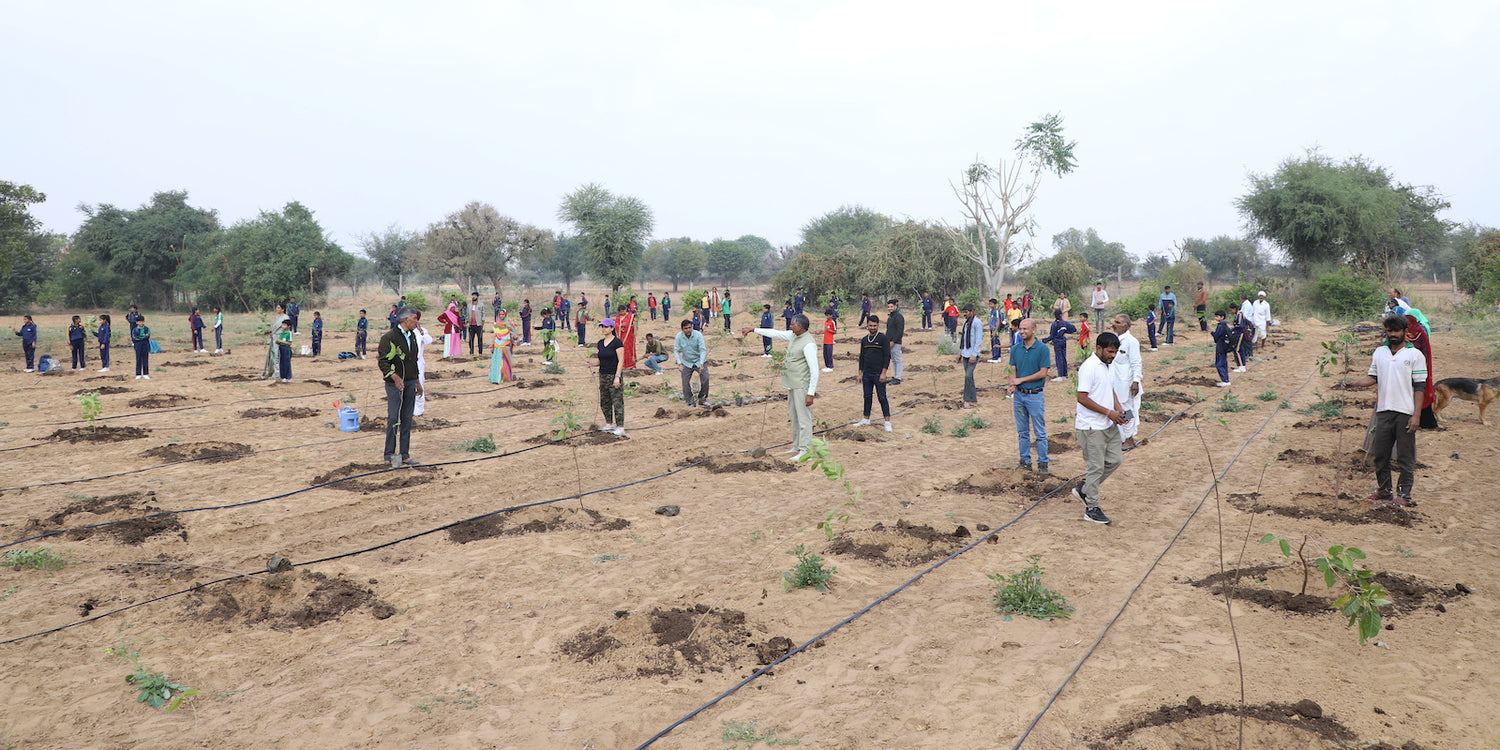Tree Plantation in Shillong
Shillong, the picturesque capital of Meghalaya, is known for its lush green landscapes and pristine natural beauty. However, like any other urban are Read more
Contact Us
-
👥 Corporates
If you are looking for:
- 🌲 Tree Plantation Events
- 📊 CSR Projects
📧 corporate@growbilliontrees.com
📞 +91 9699723523
💬 +91 9325931304 WhatsApp (Only)
🕒 Mon - Sat | 10am - 7pm IST
-
🧩 Tree Plantation NGOs
If you are looking for:
- 💰 Financial Assistance
- 🤝 Operational Support
📧 support@growbilliontrees.com
📞 +91 9699723523
💬 +91 9325931304 WhatsApp (Only)
🕒 Mon - Sat | 10am - 7pm IST
-
🌼 Individuals
If you are looking for:
- 👥 Group Tree Plantation Drive
- 🌳 Bulk Tree Plantation
📞 +91 9699723523
💬 +91 9325931304 WhatsApp (Only)
🕒 Mon - Sat | 10am - 7pm IST
Plantation Gallery
Trending
Trees for Corporates
Tree Plantation in Shillong
Shillong, the picturesque capital of Meghalaya, is known for its lush green landscapes and pristine natural beauty. However, like any other urban area, Shillong faces challenges such as deforestation, habitat loss, and environmental degradation. Tree plantation in Shillong is a vital step towards preserving its natural heritage and creating a sustainable future.
Through tree plantation drives in Shillong, we can address these challenges and promote a healthier and greener environment. Planting trees not only helps in mitigating air pollution but also conserves soil, prevents erosion, and supports the local ecosystem.
When choosing trees for plantation in Shillong, it is important to prioritize native species that are well-suited to the region's unique climate and soil conditions. Native trees have a higher chance of survival and can better adapt to the local environment.
Here are some native tree species suitable for tree plantation in Shillong:
- Khasi pine (Pinus kesiya)
- Hollong (Dipterocarpus macrocarpus)
- Khasi oak (Quercus khasiana)
- Mawphlang diengsoh (Dysoxylum binectariferum)
- Khasi damaro (Shorea robusta)
- Khasi white teak (Gmelina arborea)
- Mizo teak (Tectona grandis)
- Khasi brown sal (Shorea wallichiana)
- Khasi alder (Alnus nepalensis)
- Khasi ironwood (Mesua ferrea)
The best time for tree plantation in Shillong is during the monsoon season, from June to September, when rainfall is abundant, and the soil is moist. However, tree planting efforts can be undertaken throughout the year with proper care and attention.
By actively participating in tree plantation initiatives in Shillong, we can contribute to the conservation of its natural beauty and create a sustainable future for the city. Let us come together to plant and nurture trees, ensuring a greener and healthier Shillong for generations to come.
Corporate Tree Plantation in Shillong
Engage your company in corporate tree plantation initiatives in Shillong and contribute to the city's environmental sustainability. Collaborate with reputable organizations to organize tree planting events, promote green practices, and enhance the natural beauty of Shillong. By actively participating in corporate tree plantation activities, your company can fulfill its corporate social responsibility, create a positive impact on the environment, and contribute to the overall development of Shillong.
Tree Plantation NGOs in Shillong
Discover dedicated NGOs in Shillong that are actively involved in tree plantation and environmental conservation. Support their noble work by volunteering, making donations, or partnering for tree planting projects and awareness campaigns. By joining hands with these NGOs, you can contribute to building a greener and more sustainable Shillong for the benefit of its residents and future generations.
Tree Plantation Events in Shillong
Take part in tree plantation events organized throughout Shillong and contribute to the city's green cover and ecological balance. Collaborate with local communities, environmental enthusiasts, and organizations to plant trees, restore forests, and raise awareness about the importance of tree plantation. Participating in these events allows you to actively demonstrate your commitment to the environment and contribute to creating a healthier and more beautiful Shillong.
Tree Plantation for CSR in Shillong
Fulfill your Corporate Social Responsibility (CSR) objectives by supporting tree plantation initiatives in Shillong. Partner with trusted organizations focused on environmental sustainability and contribute to afforestation drives, urban greening projects, and climate resilience programs. By investing in tree plantation for CSR, your company can make a tangible difference in Shillong's environmental well-being and contribute to the overall welfare of the community.
Government Policies and Initiatives for Tree Plantation in Shillong
Stay informed about the government's policies and initiatives in Shillong that promote tree plantation and environmental conservation. Understand relevant regulations, incentives, and schemes aimed at preserving and expanding the city's green spaces. Collaborate with government bodies and agencies to actively participate in tree plantation drives and contribute to Shillong's sustainable development.
Shillong Tree Plantation Drive
Join the city-wide Shillong Tree Plantation Drive and be part of the collective effort to increase green cover and address environmental challenges. Work alongside fellow citizens, environmental groups, and local authorities to plant trees in public spaces, parks, and residential areas. Participating in this meaningful initiative helps make Shillong a greener, healthier, and more resilient city.
Urban Tree Plantation in Shillong
Embrace urban tree plantation strategies in Shillong to tackle urbanization challenges and enhance the city's environmental quality. Explore innovative approaches such as vertical gardens, rooftop plantations, and street tree planting to maximize green spaces in urban areas. By promoting urban tree plantation, you can contribute to making Shillong more sustainable, livable, and visually appealing.
Tree Plantation Organizations in Shillong
Connect with esteemed tree plantation organizations in Shillong that are dedicated to environmental conservation and tree restoration. Learn about their ongoing projects, volunteer opportunities, and community engagement initiatives. Collaborate with these organizations to support their endeavors, preserve Shillong's natural beauty, and create a greener future for the city.
You may like
Corporate Plantations
FAQ
Which are the best trees for tree plantation in Shillong?
Some of the best trees for tree plantation in Shillong include Pine, Oak, Rhododendron, Bamboo, Cherry Blossom, Magnolia, Deodar, Betel Nut, Khasi Pines, and Chestnut.
Which is the best season for Tree Plantation in Shillong?
The best time for tree plantation in Shillong is during the monsoon season, from June to September. The abundant rainfall during this period provides optimal conditions for the growth and establishment of newly planted trees.
How can I participate in a tree plantation in Shillong?
To participate in a tree plantation in Shillong, you can connect with local environmental organizations, volunteer with NGOs engaged in afforestation projects, or join community-led initiatives focused on tree planting. You can also reach out to the Forest Department of Shillong for information on tree plantation events and opportunities.
Which are reliable tree plantation NGOs or tree plantation organizations in Shillong?
Some reliable tree plantation NGOs and organizations in Shillong include Meghalaya Forest Department, Green Shillong, North-Eastern Space Applications Centre (NESAC), Indian Council of Forestry Research and Education (ICFRE), and North-East Network (NEN). These organizations actively promote tree plantation and offer avenues for individuals to contribute to the greening of Shillong.
What are some places to organize tree plantation in Shillong?
There are several suitable places to organize tree plantation in Shillong, such as public parks, educational institutions, community spaces, and government premises. Collaborating with local authorities, schools, colleges, or community groups can help identify suitable locations for tree plantation initiatives.
Are there any specific permits or permissions required for tree plantation in Shillong?
Specific permits or permissions may be required for tree plantation in certain areas of Shillong, especially in government-managed lands or protected zones. It is advisable to consult with the Forest Department or local authorities to understand the regulations and obtain necessary approvals before conducting tree plantation activities.
How can corporates organize tree plantation in Shillong?
Corporates can organize tree plantation in Shillong by partnering with local NGOs, participating in corporate social responsibility (CSR) initiatives, or collaborating with the Forest Department. They can contribute funds, engage employees as volunteers, and work towards identifying suitable locations for tree plantation projects.
What are the challenges in tree plantation in Shillong?
Some challenges in tree plantation in Shillong include soil erosion, unpredictable weather conditions, limited availability of suitable land, and maintaining the health of planted trees. Addressing these challenges requires implementing erosion control measures, selecting tree species adapted to local conditions, and ensuring proper care and maintenance of the planted trees.
How to care for newly planted trees in Shillong?
Caring for newly planted trees in Shillong involves regular watering, mulching to conserve moisture, protection from extreme weather conditions, and providing necessary nutrients. Timely pruning, monitoring for pests or diseases, and addressing any issues promptly contribute to the overall health and growth of the trees.
How to protect trees from pests and diseases in Shillong?
To protect trees from pests and diseases in Shillong, it is important to practice good tree hygiene, conduct regular inspections, and take preventive measures. This may include using organic pest control methods, proper pruning techniques, and seeking guidance from local horticulturists or arborists for effective disease management.























